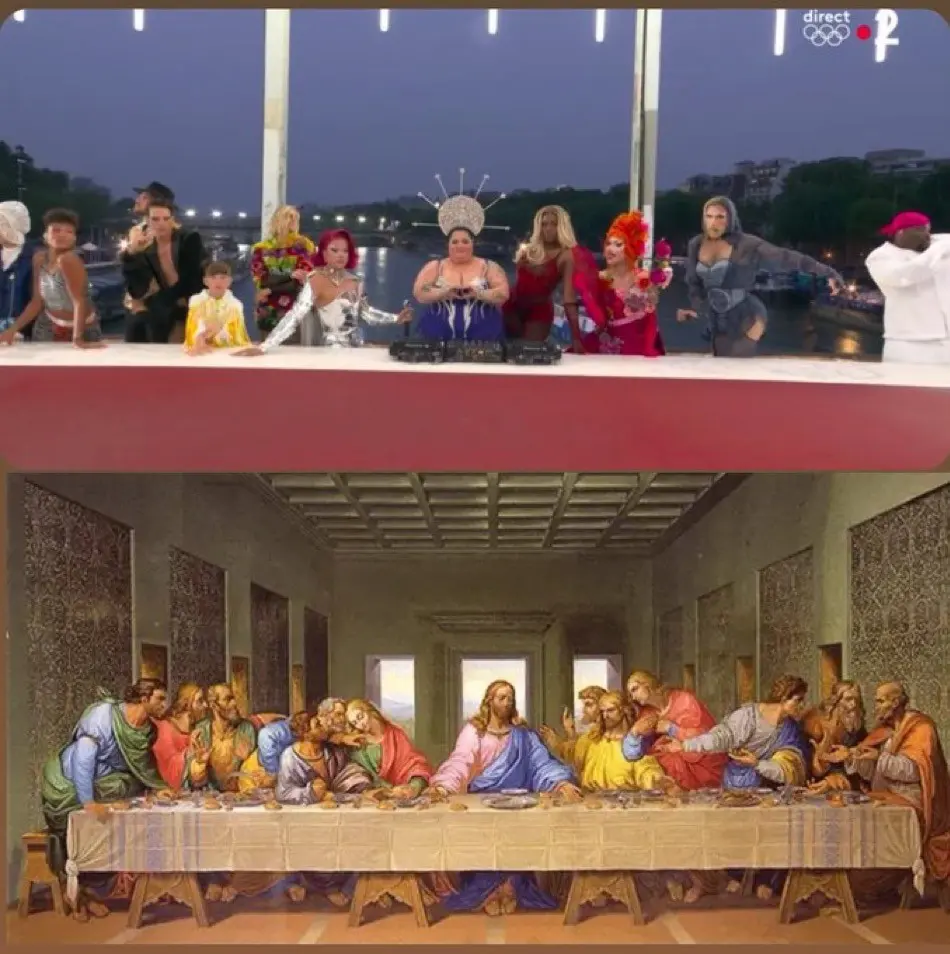
And will not God vindicate his elect, who cry to him day and night? Will he delay long over them? I tell you, he will vindicate them speedily. Nevertheless, when the Son of man comes, will he find faith on earth?” Luke 18:7-8
Jesus indicated that he would find very few to defend him or the faith through his teachings and the experiences of his disciples. We saw this when Peter and his disciples abandoned him during His Passion. We see this today.
While it is refreshing to see some bishops and priests speak out on the blasphemous portrayal mocking the Last Supper (illustrated above) at the opening of the 2024 Olympic Games, we know much more needs to be done.
We should see 100% of priests, bishops, cardinals and our pope condemning this grave and scandalous act.
Here below are a few more of the outrageous pictures taken from the incredibly offensive attack on our Lord and our faith (note we cannot share the video because the Olympic Committee’s lawyers have seen to it that those have been censored and scrubbed from sight):




France, Where Are you Heading, Eldest Daughter of the Church?
The specific elements from the opening ceremony of the 2024 Paris Olympics that are extremely blasphemous and a direct attack on our Catholic faith include:
1. Mockery of the Last Supper: The depiction of the Last Supper with drag queens, needs really no words at all other than to point out that the Last Supper institutes the Holy Eucharist. They were seated in the exact angles and positions as the Twelve Apostles. By this outrageous blasphemy of the Last Supper not only do they mock Our Lord and Savior, they mock God our Father and the Holy Spirit. They mock the Triune God.
2. Attack of the Eucharist: A drag queen seated at center of the table was wearing a crown resembling a Monstrance. This was by far the most in your face insult to our Divine Majesty, our Divine Substance.
3. Nude Singer Representing Dionysus: The appearance of a nude singer in the middle of a fruit basket, representing the Greek god of wine, was not only inappropriate as children were on that stage and among those in the audience but highly disrespectful.
4. Genitalia Exposed: A dancer on stage exposed his private parts on stage with children dancing on stage!
5. Aerial Dance on Notre Dame Cathedral: The dance segment on the scaffolding of Notre Dame Cathedral, portraying a menage-et-trois was disgusting and tasteless.
6. Attack on Catholic Queen Marie Antoinette – They depicted a scene of her decapitated body as they sang.
7. The Golden Calf: On display was the golden calf idol which is the supreme act of apostacy.
8. The Pale Horse: The Olympics had to conclude with this horse. The pale horse is associated with death and is one of the four horsemen described in Revelation 6. When the fourth seal is opened, a pale horse appears, and its rider is named Death, with Hell following closely behind. This imagery signifies the power given to the rider over a quarter of the earth, allowing him to kill through various means, including sword, famine, and pestilence.
Blasphemy, the Most Serious Sin
St. Thomas Aquinas articulated that blasphemy is one of the gravest sins because it directly insults the Divine Majesty of God. He emphasized that blasphemy is a sin against the virtue of religion, which requires giving God the honor and respect due to Him as the ultimate source of all existence. Aquinas noted that the seriousness of an affront is proportional to the dignity of the person offended, and since blasphemy is directed against God, it is inherently more heinous than other sins.
In his writings, Aquinas categorized blasphemy as a sin that can be either from the heart or the mouth. Those from the heart, harbor ill thoughts about God which may not be expressed but are nonetheless sinful. Blasphemy of the mouth is the more overt form where an individual directly and overtly disrespects God. The consequences of blasphemy can lead to a hardened heart and distance oneself from God. The act of blasphemy not only harms the blasphemer’s relationship with God but also has a detrimental effect on the faith of others. The Code of Canon Law (1368-1369) stipulates that a person who publicly utters blasphemy or expresses insults against religion or the Church may face just penalties. Historically, blasphemy was met with severe punishments, reflecting its perceived threat to social order and moral integrity.
The Church, following Aquinas’ teachings, encourages the faithful to speak out against blasphemy. This includes educating others about the gravity of the sin and promoting a culture of reverence towards God and sacred things. The Catechism of the Catholic Church (CCC2148) reinforces this by stating that blasphemy is a grave sin that undermines the respect due to God and His holy name. Therefore, the faithful are called to defend the sanctity of God’s name and to respond to blasphemous acts with a commitment to uphold the dignity of their beliefs and the teachings of the Church.
Holy Father: Deafening Silence
- Credibility and Trust:The Church’s credibility is deeply affected by scandals and blasphemous acts. When blasphemy is not addressed, it can exacerbate this distrust and create a perception that the Church is indifferent to serious offenses against its core beliefs.
- Unity and Communion: The Church is called to be a sign and instrument of unity among all people. When blasphemous acts occur and are not condemned, it can lead to division and disunity within the Church itself. Failure to respond to blasphemy can hinder this mission and create a sense of disconnection among the faithful.
- Witness to the Faith: The Church is tasked with witnessing to the truth of the Gospel and the sanctity of the Eucharist, which was instituted at the Last Supper. When blasphemy is ignored, it undermines the Church’s ability to effectively witness to the love and truth of Christ.
- Moral Responsibility: The Church has a moral obligation to speak out against blasphemy and to uphold the dignity of sacred events. Pope Pius XI noted the importance of examining one’s conscience and purifying oneself in light of the Church’s mission. A lack of condemnation for blasphemous acts can be seen as a failure to fulfill this responsibility, which can lead to a loss of moral clarity and integrity within the Church.
St. Joan of Arc, Pray for France
St. Joan of Arc exemplifies the virtues of faith, courage, and fidelity to God in the face of persecution and blasphemous acts. Her life and martyrdom serve as a powerful testimony against blasphemy and for the sanctity of God’s name.
St. Joan of Arc faced accusations, heresy and blasphemy during her trial. Despite condemnation she remained steadfast in her faith and loyal to God. Her unwavering commitment to Christ even in the face of blasphemous charges against her character and mission should be a testament to all. Let us ask St. Joan of Arc to intercede for the people of France and the Olympic Committee for repentance. St. Joan of Arc, please pray for France and the Olympic Committee.
- Boycott the Olympics
- Contact the Olympic Committee and demand a REAL apology:
- Tel: +41 216216111 – Demand that Thomas Bach (President) issue a formal apology for the blasphemy
- Email: pressoffice@olympic.org
- Email the French Ambassador Embassy: Denis Bower, office.paris@trade.gov
- Share this post with your pastor and friends
- Pray the Chaplet of St. Michael the Archangel
